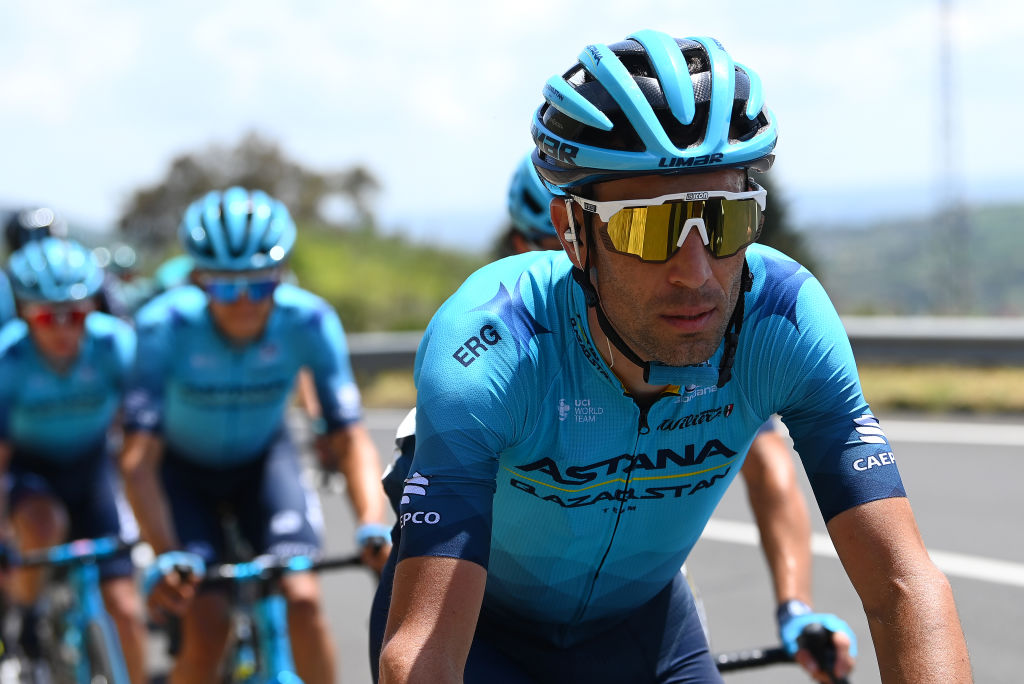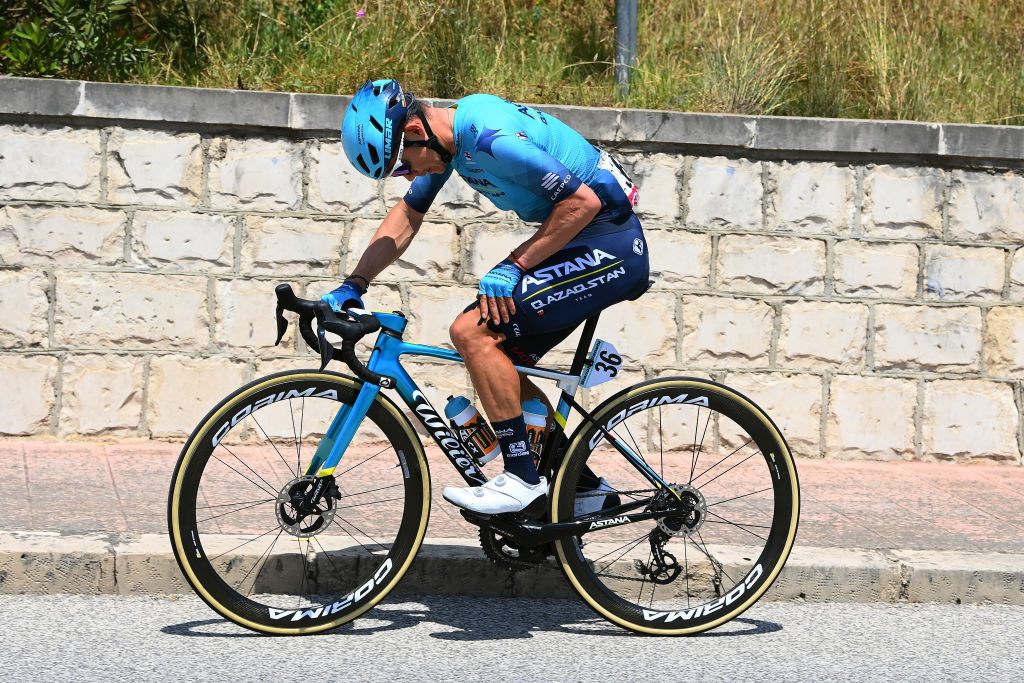No home comfort as Vincenzo Nibali slips out of Giro d’Italia GC on Mount Etna
Astana Qazaqstan must redraw plans after López’s abandon

Vincenzo Nibali’s homecoming to Messina at the Giro d’Italia on Wednesday was never likely to feature a day in the maglia rosa, despite the optimism provoked by his strong showing in the short time trial in Budapest over the weekend.
Mount Etna is a large part of Nibali’s origin story – the tale of how he needed to be towed by his mother’s car on his first ascent as a ten-year-old has been dusted off repeatedly during his career – but on Tuesday, it signalled the end of his overall ambitions at this Giro d'Italia.
In truth, Nibali’s goals for this race had been vague from the outset. It seemed his role would see him support Miguel Ángel López while enjoying his own licence to roam, attack and create spettacolo where he saw fit. When López surprisingly abandoned the Giro early on stage 4, however, Nibali was suddenly Astana Qazaqstan’s outright leader.
By late afternoon, however, the outlook was already very different. Nibali was distanced from the sizeable group of favourites on the upper slopes of Mount Etna. For a moment, he might have felt like his ten-year-old self, distraught at losing his battle with the volcano.
He quickly accepted his fate, limiting his losses as best he could on the final approach to the summit.
“I wasn’t bad, but I wasn’t able to follow the GC group,” Nibali told La Gazzetta dello Sport after he crossed the finish line, 4:52 down on stage winner Lennard Kämna (Bora-Hansgrohe) and 2:15 behind the group of pre-race favourites.
"Was the pace too high? It was just high," Nibali added.
The latest race content, interviews, features, reviews and expert buying guides, direct to your inbox!
In the overall standings, Nibali is now 32nd, 4:16 behind the maglia rosa Juan Pedro Lopez (Trek-Segafredo) and 2:34 behind Simon Yates (BikeExchange-Jayco), who remains the best-placed of the established GC contenders.
Like Miguel Indurain’s return to his native Villava a day after losing the 1996 Tour de France at Hautacam, this disappointment will do nothing to diminish the reception Nibali receives in Messina on Wednesday afternoon.
Indeed, while Indurain’s decline was as shocking as it was sudden, Nibali’s trajectory as a Grand Tour contender has been steadily downward since his last podium finish at the 2019 Giro. Losing a couple of minutes on Etna was a disappointment rather than a disaster, and Nibali should still find other ways to mark what is expected to be his final Giro appearance. It would be a surprise indeed if he does not make some aggressive cameos as the race draws on.
López and a fourth Grand Tour abandon

There will be no such luxury for Nibali’s stablemate López, who again abandoned the Giro in Sicily, as he did in the pandemic-delayed edition when he crashed out of the race in the opening time trial in Palermo.
This time around, the Colombian wheeled to a halt just a few kilometres into the race’s opening leg on Italian roads.
After the stage, Astana Qazaqstan doctor Emilio Magni’s initial diagnosis was of “tendon inflammation to the left quadriceps probably due to overload or an old injury.”
He told RAI that the team had envisaged that López might be able to nurse the injury through the next couple of days, but instead he left the race barely beyond the neutralised zone in Avola.
“We were concerned about it, but we thought we could manage it and then get through a few difficult days, but it wasn’t like that, and he had to pull out,” Magni said.
In a statement released by Astana Qazaqstan later on Tuesday, López explained that the pain had proved too much once stage 4 got underway. The rider had returned to Astana this season after an unhappy hiatus at Movistar, which ended in controversy after his abrupt abandon on the penultimate day of the Vuelta a España.
“The team staff did all possible to help me to recover during these days, but it was impossible in racing conditions,” López said. “I was hoping day by day that it becomes better, and I could pass it, but today I just could not push the pedals normally due to the pain in my thigh.”
Astana Qazaqstan directeur sportif Giuseppe Martinelli’s disappointment was evident after the finish atop Mount Etna, as was a hint of frustration. He told reporters that López had already undergone a scan on the rest day, and the prognosis had appeared positive.
“This morning, we were even quite serene, because it seemed to be less than we thought,” Martinelli said. “But then during the neutralised zone, he said he couldn’t do it. He stopped immediately. We tried to convince him, [Alexandre Vinokourov] also tried to tell him to hang tough, but if you can’t do it, you can’t do it.”
With López out of the race and Nibali out of the overall reckoning, Astana Qazaqstan must redraw their plans towards chasing stage victories, with riders like Joe Dombrowski and David de la Cruz set for greater freedom from here on in.
“When you lose a leader, you certainly have to reinvent everything, but we have the men to do it,” said Martinelli.

Barry Ryan was Head of Features at Cyclingnews. He has covered professional cycling since 2010, reporting from the Tour de France, Giro d’Italia and events from Argentina to Japan. His writing has appeared in The Independent, Procycling and Cycling Plus. He is the author of The Ascent: Sean Kelly, Stephen Roche and the Rise of Irish Cycling’s Golden Generation, published by Gill Books.